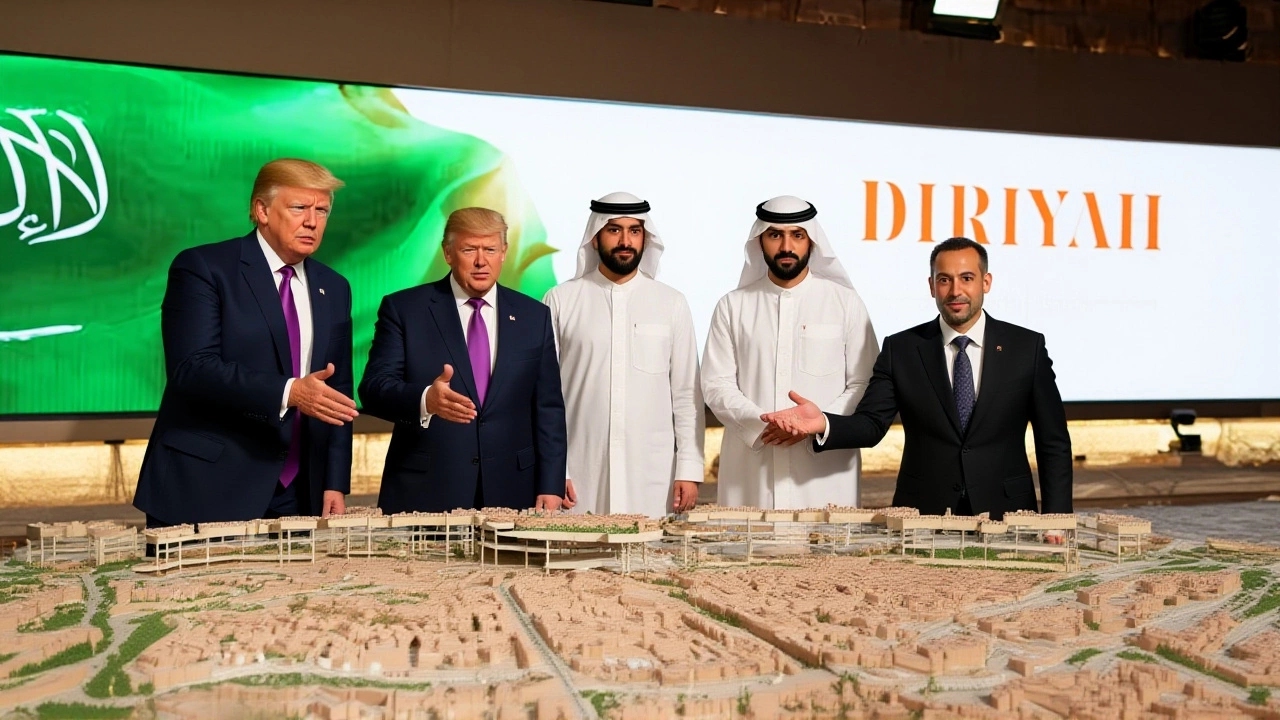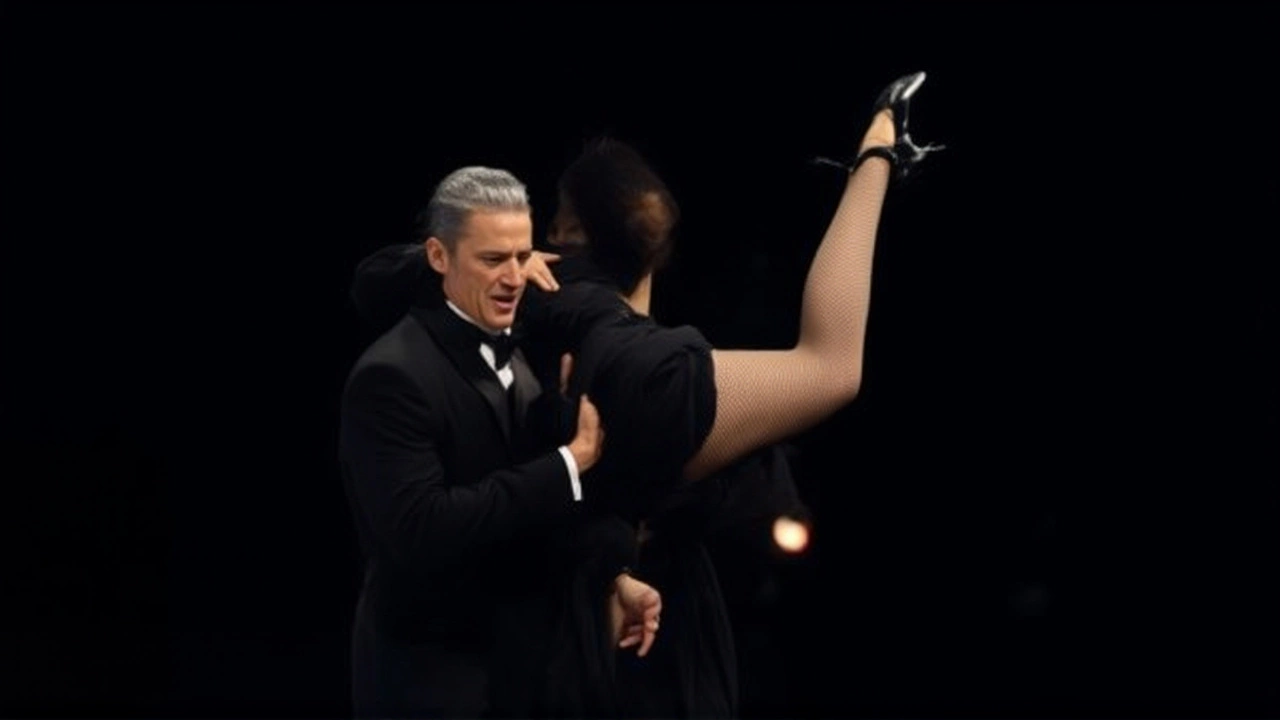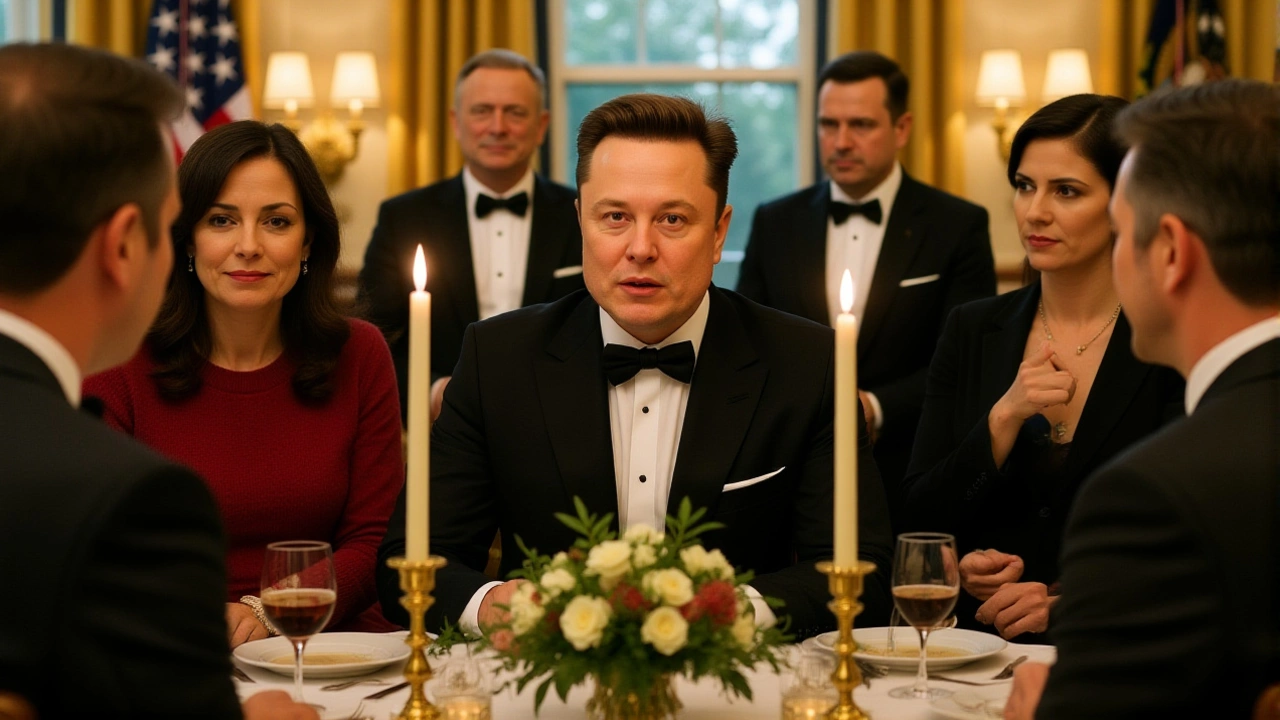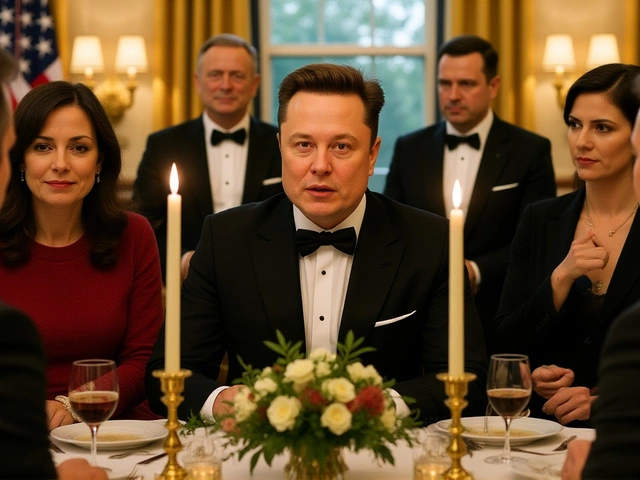On Tuesday, November 18, 2025, the East Room of the White House shimmered under crystal chandeliers as Donald J. Trump, the 45th president of the United States, welcomed Mohammed bin Salman Al Saud, Crown Prince and Prime Minister of the Kingdom of Saudi Arabia, to a lavish black-tie dinner. The event, attended by tech titans and global icons, was more than a diplomatic gesture—it was a signal of shifting alliances, corporate ambitions, and the blurred lines between power, wealth, and celebrity. The evening ended with a formal farewell on the South Lawn at 9:30 p.m. EST, closing a high-stakes visit that touched on defense, AI, nuclear energy, and the enduring controversy surrounding the 2018 killing of journalist Jamal Khashoggi.
A Dinner of Power and Paradox
The guest list read like a Who’s Who of 21st-century influence. Alongside Elon Musk, CEO of Tesla, Inc. and SpaceX, and Tim Cook, CEO of Apple Inc., sat Cristiano Ronaldo, the Portuguese football legend whose global brand dwarfs most nations’ GDPs. The presence of these figures wasn’t accidental. Each represents a pillar of the new global order: innovation, capital, and cultural dominance. Their attendance suggested that Saudi Arabia’s Vision 2030—its $500 billion bet on futuristic cities like NEOM—isn’t just a national project. It’s a magnet for the world’s most powerful players.Trump didn’t shy away from the elephant in the room. According to The Independent, he publicly defended the Crown Prince’s alleged role in the 2018 murder of Jamal Khashoggi inside the Saudi consulate in Istanbul. U.S. intelligence agencies concluded in 2021 that bin Salman approved the operation. Yet here, in the heart of American democracy, Trump offered no condemnation. Instead, he framed the Crown Prince as a strategic partner—someone who could help secure U.S. interests in the Middle East, from oil pipelines to AI infrastructure. The message was clear: geopolitics now runs on pragmatism, not principles.
"You Are So Lucky," Trump Tells Musk
The most memorable moment of the evening came during dessert. As reported by Times of India, Trump turned to Musk and said, "You are so lucky." The remark, delivered with a grin, was reportedly in reference to Musk’s rare access to the highest levels of both U.S. and Saudi power. It was only their second in-person meeting since Trump’s return to office. For Musk, whose companies are deeply entangled in defense contracts and space ambitions, the invitation was a golden ticket. SpaceX has already been in talks with Saudi Arabia over satellite infrastructure, while Tesla’s energy storage systems could play a role in powering NEOM’s grid. The comment wasn’t just casual banter—it was a nod to the unspoken deal: access in exchange for influence.Tim Cook’s presence signaled Apple’s interest in expanding its footprint in the Gulf. With Saudi Arabia pushing to become a tech hub, Apple’s supply chain and retail partnerships could benefit from billions in state-backed investments. And then there was Ronaldo. His appearance wasn’t just about glamour. It was branding on a planetary scale. Saudi Arabia has spent over $1 billion in recent years acquiring global sports stars—Ronaldo, Neymar, Benzema—to burnish its image. His presence at the White House wasn’t just symbolic. It was a message to the world: this isn’t just a monarchy. It’s a brand.

What Was Really on the Table?
Beyond the caviar and champagne, the agenda was dense. Officials confirmed discussions on four major fronts: defense cooperation, artificial intelligence, nuclear energy collaboration, and potential normalization of relations between Saudi Arabia and Israel. The U.S. is reportedly considering selling advanced drone systems and missile defense tech to Riyadh. Meanwhile, AI talks may involve partnerships between U.S. tech firms and Saudi’s Public Investment Fund, which is already investing billions in AI startups. Nuclear energy discussions could pave the way for U.S. companies to help build civilian reactors—a sensitive issue given Saudi Arabia’s long-standing interest in nuclear capability.And then there’s Israel. For years, the U.S. has quietly pushed for Saudi-Israeli normalization. A peace deal would be historic. But it hinges on one thing: Saudi Arabia’s willingness to publicly accept Israel’s legitimacy. The Crown Prince’s presence at the White House, surrounded by American tech billionaires, suggests that behind closed doors, that door may be cracking open.
The Ripple Effect
The optics of the dinner sent shockwaves through global markets. Within hours, shares of Tesla and Apple ticked up slightly, though no official deals were announced. Analysts noted that the real value wasn’t in immediate contracts—it was in signaling. When the world’s most powerful nations and corporations gather in the same room, deals follow. Even if they’re not signed that night.Human rights groups were quick to react. Amnesty International called the event "a moral failure," citing the continued impunity for Khashoggi’s killers. Meanwhile, U.S. lawmakers from both parties expressed unease. Senator Chris Van Hollen (D-MD) said, "Hosting a man accused of authorizing the murder of a U.S.-based journalist at the White House isn’t diplomacy—it’s normalization of brutality." But in Trump’s world, diplomacy has always been transactional. And for now, the transaction appears to be worth it.

What Comes Next?
No official timeline was announced for follow-up meetings. But the groundwork is laid. Musk has already hinted at a "major announcement" in early 2026. Apple is reportedly exploring a new retail and data center partnership in Riyadh. And Saudi Arabia’s sovereign wealth fund, already the world’s largest, is eyeing a $10 billion stake in U.S. AI infrastructure. The real test will come in 2026, when Congress votes on arms sales to Saudi Arabia. Will lawmakers block the deals? Or will economic interests silence dissent?One thing is certain: the White House dinner wasn’t just about dinner. It was about the future—of power, of profit, and of who gets to shape it.
Frequently Asked Questions
Why was Cristiano Ronaldo at a White House dinner with a Saudi prince and tech CEOs?
Ronaldo’s presence was a strategic branding move by Saudi Arabia. The kingdom has spent over $1 billion since 2021 to attract global sports stars to boost its international image. His appearance at the White House wasn’t about sports—it was about legitimacy. By associating with Trump, Musk, and Cook, Saudi Arabia signals it’s not just a petrostate—it’s a global player in culture and commerce.
What did Trump mean when he told Elon Musk, "You are so lucky"?
The remark was a veiled acknowledgment of Musk’s unique access to global power centers. As the only CEO with direct ties to both the U.S. presidency and Saudi leadership, Musk stands to benefit from deals in space tech, AI, and energy storage. The comment wasn’t just personal—it was political, signaling that Musk’s companies are now key players in U.S.-Saudi strategic partnerships, potentially worth billions.
Is the U.S. ignoring human rights concerns by hosting Mohammed bin Salman?
Yes, by most international standards. U.S. intelligence confirmed in 2021 that the Crown Prince approved the killing of Jamal Khashoggi. Yet Trump’s administration chose to prioritize defense deals, AI collaboration, and potential normalization with Israel. This reflects a broader trend: economic and strategic interests are increasingly overriding human rights in U.S. foreign policy, especially under Trump’s transactional approach.
Could this dinner lead to a Saudi-Israeli peace deal?
It’s possible. The U.S. has long pushed for Saudi-Israeli normalization as part of a broader regional security framework. With Trump’s support and Saudi Arabia’s growing interest in tech and defense partnerships, the Crown Prince may see normalization as a price worth paying—for access to U.S. tech, weapons, and diplomatic backing. But without public concessions from Saudi Arabia, any deal would likely remain secret.
What role does Vision 2030 play in this visit?
Vision 2030 is the engine driving the entire visit. Saudi Arabia needs $1 trillion in foreign investment to fund its $500 billion NEOM project and other initiatives. U.S. tech giants like Apple and Tesla are prime targets. The dinner wasn’t about hospitality—it was a pitch. By bringing Musk and Cook to the White House, Trump signaled that American companies are welcome to invest in Saudi Arabia’s future, even if its past remains controversial.
Will this affect U.S. congressional votes on arms sales to Saudi Arabia?
Likely not. While some Democrats have pushed to block arms sales over human rights concerns, Trump’s influence and the economic stakes involved make it difficult to rally enough opposition. With defense contractors like Lockheed Martin and Raytheon already tied to Saudi contracts, and with the administration framing the sales as critical to regional stability, congressional resistance is expected to be muted—even if public outcry grows.



